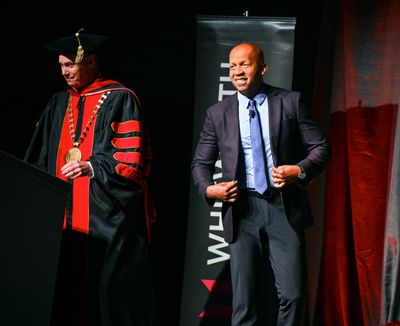Bryan Stevenson speaks on how America can ‘do justice, love mercy and walk humbly’

Some 1,200 people filled a room Thursday at the Spokane Convention Center. Plates, cups and cutlery were arranged for breakfast on more than 100 tables under its high ceiling.
But there was no din of the crowd as Bryan Stevenson told the story of a little boy who shot and killed the boyfriend of his mother.
The man had punched his mom so hard she collapsed, striking fear into the boy that she was dead. When the boyfriend fell asleep, the boy retrieved a gun and pointed it at his head. As he held the gun, the boyfriend jumped in his sleep, startling the boy and causing him to fire.
The boyfriend happened to be a deputy.
The boy, younger than 10, was sent to an adult prison where he was sexually abused.
Stevenson, a lawyer, recalled how he met with the boy, who pleaded with him not to leave him in the prison. Stevenson promised to get him out.
And he did.
The boy has since gone to college and now works as an engineer. His mom recovered from the beating that had left her unconscious.
Stevenson, the featured speaker at Whitworth’s presidential leadership forum, also told the story of an intellectually disabled man on death row who remained wholly grateful to Stevenson even as his efforts to exonerate the man failed and failed and failed. And of a Black woman and a white man who cried together on an Alabama roadside remembering a man who had been lynched at the site decades before.
The room was silent.
“I didn’t think to bring a Kleenex,” Samantha Nixon said after Stevenson’s speech.
Even as Stevenson moved some to tears, his words were sometimes met with laughter, or breaths of outrage and murmurs of agreement.
A graduate of Harvard Law School, Stevenson is now a professor, an author and the founder of the Equal Justice Initiative, a nonprofit that provides legal representation to poor prisoners who may have been wrongly convicted of crimes. He has received numerous awards and dozens of honorary degrees from universities, including Princeton, Oxford and, as of Thursday, Whitworth.
Stevenson’s great-grandfather was a slave who learned to read even though it was illegal for enslaved people to be literate.
Stevenson’s grandfather didn’t graduate high school because there were no high schools for Black students near where he lived.
America’s racial history continues to sow pollution, distrust and division in society, and politics of fear and anger allow injustices to continue, Stevenson said.
“All over the world, there seems to be a wave of violence and fear,” he said. “I could talk about these problems all morning.”
But Stevenson’s speech at the forum instead brought a message of hope to attendees. He offered steps that Americans can take to restore community, belonging and justice.
Proximity to the poorest in society is one of those steps.
“It’s very easy to isolate yourself from the problems of the poor,” Stevenson said. “Our distance allows us to misperceive things.”
Stevenson said a disconnect between legislative officials and marginalized people in society has led to the passing of ineffective policies.
“What you see and what you hear changes your worldview and deepens your understanding of the world,” he said. “If I’ve helped anybody, it’s because I’ve gotten proximate to a condemned person and heard his song.”
“Sometimes we just have to be close enough to put our arms around them and affirm their humanity.”
Additionally, Stevenson says the United States needs to address its racial history.
Referring to the treatment of Native Americans when Europeans arrived in the Americas, and to the decades of slavery that followed, Stevenson said, “we really haven’t reckoned with all that violence and destruction.”
In Berlin, Stevenson pointed out, there are countless memorials dedicated to victims of the Holocaust.
“We have to free ourselves from the silence that has allowed this contamination to grow.”
This contamination has led to America locking people up instead of helping them, Stevenson said, labeling drug addicts as criminals instead of people with a health issue.
“Why is it when we see brokenness in other people we hate them for it?” he asked.
Stevenson said hope and a willingness to do uncomfortable things is essential for change: “We have to push back against narratives that are rooted in bigotry and fear.”
“I believe each person is more than the worst thing they’ve ever done,” Stevenson said during the closing of his speech. “I believe the opposite of poverty is not wealth. I believe the opposite of poverty is justice.”
Stevenson received a standing ovation, and Whitworth’s president, Scott McQuilkin, announced the university would establish a scholarship in Stevenson’s name and vowed the school would continue to uphold Stevenson’s values.
Audience member Claudine Richardson said she appreciated Stevenson’s message.
“I really enjoyed the subject matter that the facilitator and the speaker focused on because they spoke about hope,” she said. “They spoke about hope with accountability.”
Nixon agreed.
“I loved Bryan’s words on hope, and that’s what can keep bringing us forward. But it’s important for us to come together as a society so we can move forward together,” she said. “I am still processing everything I heard. I got very emotional. I am very moved.”